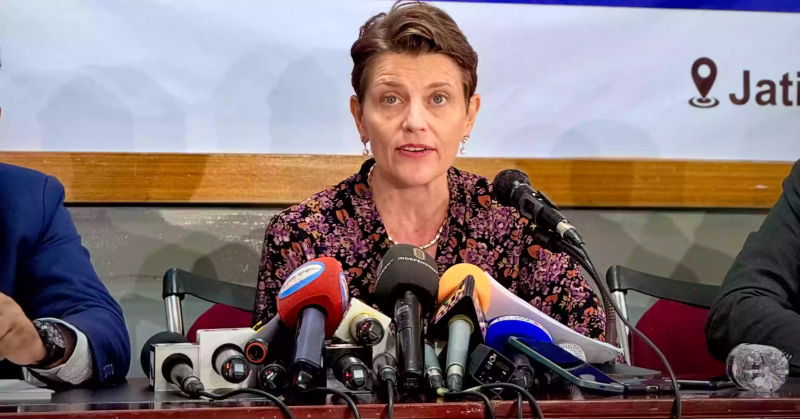- Tarique Rahman to Return Home With Daughter on Dec 25 |
- ILO praises Bangladesh’s labour reforms, new milestones |
- Depositors stranded as Sammilito Islami Bank is in liquidity crisis |
- BNP faces uphill task to reach seat-sharing deal with allies |
- Bangladesh rejects India’s advice; vows free, fair polls |
Inclusive politics key to avoid unrest in BD: UN Coordinator

United Nations Resident Coordinator in Bangladesh, Gwyn Lewis, has emphasised that the inclusion of all political parties is essential to prevent polarisation and possible unrest, while also noting that such matters must be considered within the country’s unique political context.
“But I think circumstances need to be looked at... the decision of the government needs to be considered in the context of the country. It is very much a political decision, and again, a decision of the government,” she said while responding to a question about a UN fact-finding mission’s recommendations against banning political parties.
She highlighted that the reform efforts initiated by the interim government are commendable, describing the process as “very robust.”
The Office of the United Nations High Commissioner for Human Rights (OHCHR), in its fact-finding report, offered several recommendations across areas such as justice, security, civic space, political processes, and economic governance. One key recommendation was that banning political parties would undermine a genuine return to multiparty democracy and effectively disenfranchise large segments of the electorate.
Lewis clarified that she would not comment on the political positioning of either the Awami League or the BNP, stressing that the UN maintains neutrality and does not involve itself in domestic party politics.
Reaffirming the UN’s support for peaceful and credible elections, she said inclusive elections mean every citizen should have the right to vote and the ability to participate fully. “Inclusiveness, for the UN, means ensuring every Bangladeshi has a voice,” she stated.
On the issue of national healing and reconciliation, she suggested a process of extensive consultations with the people. “Our advice on truth and healing would be strong national consultations with the people of Bangladesh to hear their voices and thoughts on how they see the future,” she added. However, she noted that it is difficult to define a specific path without these consultations taking place.
Lewis also revealed that preparations are underway to establish an Office of the UN High Commissioner for Human Rights in Bangladesh. “We understand from the government that an MoU has been finalised. We are waiting to sign it soon,” she said, adding that the office will help support various ongoing reforms, including those in political, administrative, security, and judicial sectors.
The UN fact-finding mission, in a report submitted last year, documented human rights violations during the July–August 2023 unrest, reporting that around 1,400 people were killed during and after the violence. The International Crimes Tribunal is currently trying the individuals responsible for those violations.
Bangladesh, a member of the United Nations since 1974, has long demonstrated commitment to international cooperation and peace. The country is also recognised as one of the largest contributors to UN peacekeeping missions globally.
Lewis also addressed the ongoing Rohingya crisis, expressing concern over funding shortfalls. During a recent meeting with the Chief Adviser, the need for continued global solidarity and increased support to improve conditions for the Rohingya was highlighted. The prospects for their repatriation remain uncertain due to the unstable situation in Myanmar’s Rakhine State.

